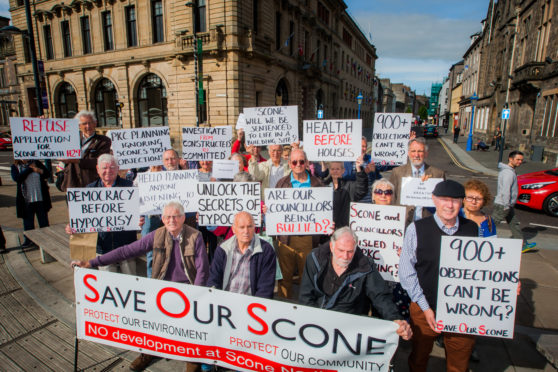Madam, – J.E. Thomson (Planning for the future in Fife, Courier, June 11) suggests William Dryburgh talks to the planners if he wants to understand why the decisions coming from Scottish government reporters appear inconsistent.
I’m not sure the planners understand either.
Planning applications are determined by testing them against a raft of planning policies.
Complex or controversial applications will rarely tick every box, so it becomes a judgement as to whether the yeses outweigh the noes.
A council planning committee will debate that in public and come to a conclusion.
However, when the committee says no and the applicant appeals, the final decision rests with a Scottish Government reporter, an unelected and unaccountable official.
I wouldn’t suggest for a moment that the reporters don’t work diligently in coming to their conclusions.
But there doesn’t seem to be anything in place to ensure that those conclusions are consistent.
That’s the flaw in the system.
Individuals are given the final say with no checks or balances.
Until that’s fixed, there won’t be any logic to the outcomes.
Cllr Dave Dempsey.
Leader of the Opposition Group,
Fife Council.
Politicians are not peas in a pod
Madam, – Poor Martin Redfern he never seems to get things quite right, (Stronger words than action, Courier, June 11).
To compare Boris Johnson to Joanna Cherry smacks of the old chalk and cheese syndrome.
He is spot on with suggesting it is increasingly apparent that Boris has his eye on becoming the permanent resident at 10 Downing Street.
But to add that Joanna Cherry is after the job of Scotland’s First Minister is completely wide of the mark as the lady is, unlike the oft bumbling Mr Johnson, just one of a group of very good speakers who represent their party at Westminster.
Again his claim that both persons pander to the hard core of their parties support is half right as Boris, to be fair to him, has made his position quite clear, unlike Joanna Cherry who is regularly called upon to speak for her party due to her highly-qualified legal background.
His conclusion that both may eventually prove to be stronger on rhetoric than implementation is, to quote an oft used phrase by Dr John Cameron of St Andrews, “quite risible” when trying to link the performances attributed to the bumbling Boris with the polished delivery of the erudite Joanna in the House of Commons.
Allan. A. MacDougall.
37 Forth Park,
Bridge of Allan.
Power grab or sooking up?
Madam, – Bobby McDonagh, former Irish Ambassador to the UK and EU, said this about the SNP’s claymore-rattling over Rockhall: “The SNP Government, whose principal policy is to seek independence, is forcefully asserting its interpretation of UK rights more than the UK Government itself”.
I can think of only three reasons for this: it is either a belated sooking up to Scots fishermen, a virtue signalling attempt to show up Westminster or a “power grab” for a couple of frigates and a big tricorn hat so that SNP External Affairs Secretary, Rear Admiral Fiona Hyslop, can carry out her threat that vessels will be deployed to take enforcement action against Irish vessels found fishing within 12 miles of Rockall”.
Pathetic.
Allan Sutherland.
1 Willow Row,
Stonehaven.
Sobering energy statistics
Madam, – BP has just released its long-awaited world energy statistics for 2018.
When you compare the 2018 data to that of 2017 it makes sobering reading for those who believe that decarbonisation will combat climate change.
The percentage of world energy that came from fossil fuel fell only slightly, from 85.1% to 84.7%.
At that rate it would take 211 years to decarbonise, therefore the aims of the Paris agreement are impossible.
The most startling revelation is how quickly rare minerals are running out.
Cobalt, vital for high-capability batteries for electric vehicles and energy storage, had a known reserve, still in the ground, of 52 years in 2017.
The layman might assume this would reduce to 51 years by 2018, but that is not how it works.
The reserve actually plummeted to 42 years due to soaring demand.
If that rate of decline were to continue, reserves would be down to one year by 2037.
And, despite the sums spent on renewables, global CO2 emissions rose from 33 billion tonnes to 33.7bn tonnes.
Geoff Moore.
Alness,
Highland.
UK has lost its sense of humour
Madam, – It is absolutely ridiculous that professional satirical comedians cannot make jokes about current events without “victims” calling for police involvement.
Jo Brand’s comments about Nigel Farage and battery acid was nothing more than tongue-in-cheek and for Nigel Farage to call for police investigation for inciting violence is completely over the top.
This comes from someone who has spoken out against snowflakes and political correctness.
It is time people in Britain got back their sense of humour.
Gordon Kennedy.
117 Simpson Square,
Perth.
BBC should examine output
Madam, – I write to express my total disgust at the BBC’s decision to scrap the TV licence for the over 75s.
This is a callous move, penalising people who have given so much to their country in their work, in whatever form, throughout their lives.
Some rely on TV for companionship as they are often unable to get out while some have only their meagre pension to rely on for financial stability.
This disgraceful decision may cause hardship for many.
The BBC needs to look at the way it fritters away money raised by the present licence fee on some really sub-standard programmes, and put it towards enabling the over 75s to have free TV viewing.
Alister Y Allan.
Castle View,
Letham, Perth.
